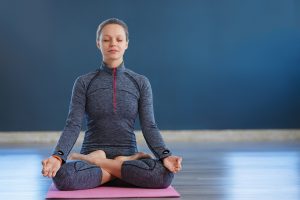More Adults and Children Using Integrative Health Approaches
 You’ve probably seen this in the unlikeliest place, perhaps the lawn of a city park or on a public beach – a group of people performing complex yoga poses, or a meditator, with legs folded, in deep concentration. If it appears to you that more Americans are meditating or doing yoga, that’s because it’s true. A nationwide survey shows that the number of American adults and children pursuing these integrative health approaches has increased markedly over the past few years.
You’ve probably seen this in the unlikeliest place, perhaps the lawn of a city park or on a public beach – a group of people performing complex yoga poses, or a meditator, with legs folded, in deep concentration. If it appears to you that more Americans are meditating or doing yoga, that’s because it’s true. A nationwide survey shows that the number of American adults and children pursuing these integrative health approaches has increased markedly over the past few years.
The survey by the National Institutes of Health (NCCIH) and the Centers for Disease Control and Prevention (CDC) is conducted every five years as part of the National Health Interview Survey (NHIS) of Americans’ health and illness-related experiences. “The 2017 NHIS survey is the most current and reliable source of information on the use of specific complementary health approaches by U.S. adults and children,” said David Shurtleff, Ph.D., acting director of NCCIH. “The survey data suggest that more people are turning to mind and body approaches than ever before.”
For instance, the survey revealed that practicing yoga – the most popular complimentary health practice among U.S. adults – rose from 9.5 percent in 2012 to 14.3 percent in 2017, and the use of meditation tripled to 14.2 percent in 2017. Women were more likely than men to practice yoga and meditation, the 2017 survey also showed.
As for children, yoga use among 4- to 17-year-olds increased from 3.1 percent in 2012 to 8.4 percent in 2017. Mediation among this age group also saw a sharp rise, from 0.6 percent to 5.4 percent. In 2017, girls were more likely to practice yoga, and older children – between 12 and 17 – were more likely to meditate.
The American Board of Integrative Medicine (ABOIM), a Member Board of the American Board of Physician Specialties® (ABPS), hails the results of this survey, and is affirmed in its mission to foster healthy living through the use of all appropriate therapeutic approaches, disciplines, and lifestyle practices, including yoga and meditation. We believe that an integrative health approach can lead to optimal health and well-being in mind, body, and spirit for adults and children alike, and we offer physician certification in integrative medicine for doctors who seek to improve the lives of their patients through an integrative health practice. For information about the ABOIM, contact the ABPS today.






